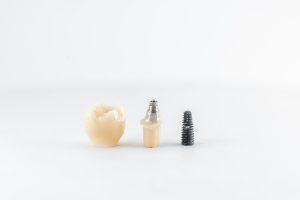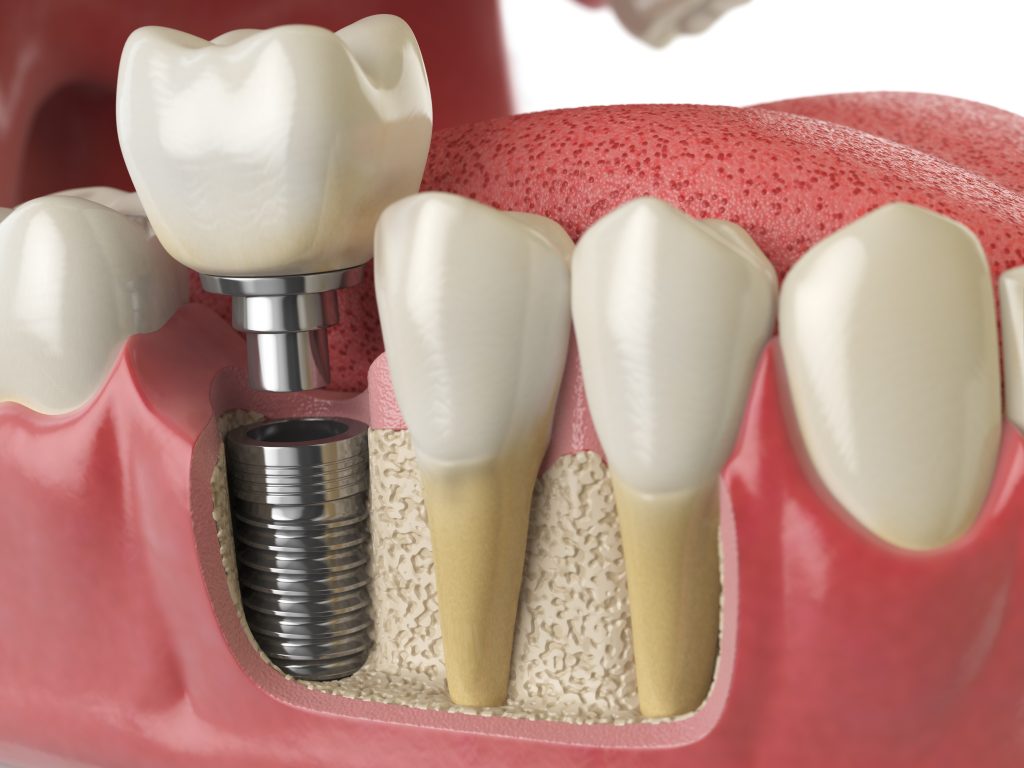If you have extensively damaged or missing teeth, your dentist may recommend dental implants to replace the affected teeth. If you are a Medicare beneficiary, the first question that may cross your mind will be, “does Medicare cover dental implants for seniors?”
So, does Medicare cover dental implants for seniors? The simple answer is “no.” If you want insurance to cover your dental implants procedure, you need to enroll in a Medicare Advantage (MA) plan or purchase separate dental care insurance.
Read on to learn more about Medicare coverage and dental implants in general.
What Are Dental Implants
Mayo Clinic defines a dental implant as a device that acts as a replacement for the root of a tooth. Most implants are made of titanium and comprise a post, connector, and replacement tooth designed to match your natural teeth.
Dental implants are a great alternative to conventional dentures and help repair broken or missing teeth where bridgework isn’t possible.
These implants are an option for people born without a tooth or those who have lost some of their teeth for several reasons. They are more permanent, and only a few people can differentiate them from natural teeth.
The dental implant process is usually done on an outpatient basis and can take several months to complete. The first thing your dentist will do is remove the damaged teeth before preparing the jawbone that will receive the implant.
Your dentist will then implant a metal screw or post below your gum line in the jawbone. Once the jawbone has healed completely, your dentist proceeds to attach the replacement tooth to it.
What Is the Cost of Dental Implants?
The overall cost of a dental implant varies depending on the individual who wants it. There are a lot of different considerations that go into placing a dental implant, such as bone and tissue, making it difficult to give a one-size-fits-all figure.

On average, a single implant can cost anything between $3,200 and $6,000. This includes the cost of the actual implant, replacement tooth, crown, and abutment. These figures are based on a single implant.
So, if you need more than one implant, you will pay more.
Does Medicare Cover Dental Implants for Seniors?
As mentioned earlier, Original Medicare (Medicare parts A and B) doesn’t provide dental coverage. However, most Medicare Advantage plans, which serve as an alternative to Original Medicare, offer a significant amount of coverage for many dental needs.
But not all Medicare Advantage plans cover dental implants, and there is a reason for it. Implants fall under a special branch of dentistry known as prosthodontics, which includes designing and fitting artificial teeth replacements.
Dental implants are an alternative option to bridgework and dentures designed to provide relatively strong support for your natural teeth. It means that getting a dental implant involves surgery. In fact, the three primary components of dental implants are:
- Surgical placement of the implant post designed to replace the root portion of the missing tooth.
- Installation of a root extension known as an abutment.
- Placement of the crown (artificial tooth) on the abutment to give you a look and feel of a real tooth.
Depending on the type of dental implant you order and the general condition of your jawbone, the process can involve more procedures. The entire process takes months because the jawbone has to heal around the implant.

Dental implants can be an expensive and extensive process. In fact, choosing implants is a big decision that must be made between you and your dentist. The dentist will consider the health of your jawbone, the process involved, and your ability to handle it before recommending it.
What Plan Covers Dental Care
Most Medicare Advantage plans usually offer additional benefits, including dental care coverage. The dental care coverage may include some services relating to dental implants.
Medicare Advantage plans are offered by Medicare-approved insurance providers. Therefore, these plans can include supplemental healthcare benefits not available under Original Medicare.
For instance, almost all Medicare Advantage plans include coverage for routine dental care such as cleanings and annual examination.

Some Medicare Advantage plans offer affordable supplemental dental care insurance, covering more complex dental procedures such as fillings, tooth extractions, and other forms of tooth replacement or restoration procedures such as dental implants.
Before you start the process, ensure you find out if you need to get the implant from an in-network provider to be covered. You should also find out the amount of money your plan will pay and how much money you need to pay out-of-pocket.
Keep in mind that if you choose to purchase a supplemental dental insurance policy, there may be a separate monthly premium for it, separate from your Medicare Advantage premium.
Does Medicare Cover Anything Related to Dental Care?
The only dental care costs that Medicare covers are those related to injury or illness. For instance, if your cardiologist needs a dentist to perform a checkup that may help to clear your kidney or heart valve for surgery, Medicare may cover the costs related to it.
Likewise, your primary doctor recommends dental reconstruction of your jawbone after an accident; Medicare will fully cover the costs related to it.
On the other hand, the costs of routine dental care, checkup, or any other treatment unrelated to injury or illness, won’t be covered.
Does Medicare Cover the Cost of Medications for Oral Surgery?
If your doctor recommends oral surgery and needs to be performed in a hospital, Medicare Part A may kick in and cover your in-hospital medications. Nothing else is covered under Original Medicare.
It means that your Part A won’t cover any antibiotics or pain-relieving medicine administered to you while in hospital. It may even fail to cover some of the prescribed drugs used before and after your hospital stay.

In such a case, you need a separate Prescription Drug Coverage plan or a Medicare Advantage plan with prescription coverage to cover your medication related to the oral surgery.
This includes pain-relieving medications, antibiotics, and other prescription drugs your healthcare provider may prescribe for use before and after the surgery.
Do You Still Have Questions? We Can Help!
There are many things you need to go through while preparing for your dental implants. So, if you have got Original Medicare or Medicare Advantage and are still not sure whether some of the costs will be covered, we can help you!
We have a team of highly qualified and licensed insurance agents ready to speak with you and answer any questions that you might have. Contact us today, and we shall gladly help you find answers to the questions you might have!
